Jette Kernion's blog
Lone Star Cinema: Poltergeist (1982)
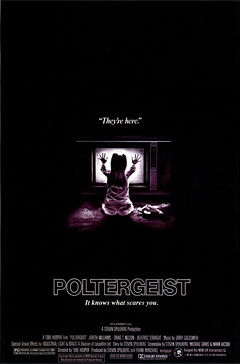 I realize I'm cheating a bit by considering Poltergeist a Lone Star Cinema selection, since the connections seem pretty sparse, as you'll see in the last paragraph. Watching the trailer for the upcoming remake (in theaters later this month) made me want to see the 1982 movie again -- I'd seen it only once before, on a bootleg VHS tape in the mid-1980s.
I realize I'm cheating a bit by considering Poltergeist a Lone Star Cinema selection, since the connections seem pretty sparse, as you'll see in the last paragraph. Watching the trailer for the upcoming remake (in theaters later this month) made me want to see the 1982 movie again -- I'd seen it only once before, on a bootleg VHS tape in the mid-1980s.
The most surprising thing about Poltergeist is how very odd it is. It's just weird, at least from a contemporary point of view. It's as though someone took the hallmarks of Steven Spielberg's 1980s filmmaking and twisted them into something almost distastefully creepy. That someone may have been director Tobe Hooper (The Texas Chain Saw Massacre) or producer/co-writer Spielberg himself. I was entirely absorbed by the movie this go-round, but I can't really say I liked it.
For anyone left who hasn't heard of the movie (or only knows its "They're here!" tagline), Poltergeist is about a typical suburban family that has to deal with strange, supernatural activities in their otherwise typical suburban house, just as contractors are digging up part of the yard for a swimming pool. The younger daughter, Carol Anne, is particularly susceptible ... and eventually vanishes into thin air, although audible from the static-y TV set (who else remembers static?).
One thing I do remember from seeing Poltergeist as a teenager is my utter amazement that even though Carol Anne is kidnapped by supernatural beings, the family continues to live in the house. I still can't believe they stay there as long as they do, although that does add extra satisfaction to the final scene. This time, though, I can't believe that they don't call the police or let anyone know about Carol Anne's appearance except a handful of parapsychologists, led by Dr. Lesh (Beatrice Straight). And of course you know Zelda Rubinstein is going to turn up eventually.
(Aside: While I saw Poltergeist on crappy VHS, I saw Poltergeist 2 in a theater, on a date. I realize now that I remembered the sequel more clearly than the original, which led to further surprises since I recalled different outcomes for certain characters. I am slightly tempted to watch the sequel again to verify, but I also remember that movie as being mega-dumb, so nope.)
Site News: Slackerwood Prepares to Wrap Up
I've been writing for and editing Slackerwood now for about nine years -- a long time, especially on the internet. And while it's been a wonderful experience, I feel like it's time for me to move on.
May 27, 2015 will be the last day we'll publish content to Slackerwood. The site will still remain online and searchable but it'll be an archive, essentially. Over the next month, we'll be winding down with a few final editions of regular columns and other coverage.
Why close the site? Because Slackerwood doesn't deserve an even slightly restless editor, to paraphrase Jon Stewart. Editing and publishing Slackerwood, while often delightful and rewarding, is a time-consuming job. After nine years, I'd like to spend that time doing other things, like more writing.
Review: Adult Beginners
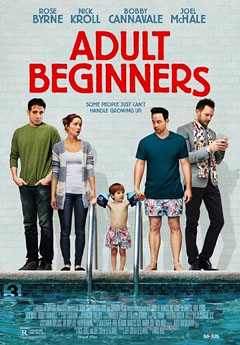 Have you seen the indie film about the young ambitious-but-party-loving professional who has to move in with relatives after a heartbreaking business failure? Or how about the one where the estranged siblings are thrown back together and try to rebuild a strong relationship, in spite of their parents? Or maybe the movie where the single person or childless couple learn how much they've missed by not having children in their lives.
Have you seen the indie film about the young ambitious-but-party-loving professional who has to move in with relatives after a heartbreaking business failure? Or how about the one where the estranged siblings are thrown back together and try to rebuild a strong relationship, in spite of their parents? Or maybe the movie where the single person or childless couple learn how much they've missed by not having children in their lives.
Adult Beginners retreads these all-too-familiar paths, but in such a pleasant way -- and with such an amusing cast -- that it's rarely tiresome.
Jake (Nick Kroll) is one of those entrepreneurial types so familiar here in Austin (although he's wheeling and dealing in NYC) ready to launch The Next Big Thing. At the peak of his fabulous launch party, however, the venture collapses irretrievably, leaving him broke, unemployed and lacking any belief that he can do much of anything successfully. Jake moves in with his sister Justine (Rose Byrne) and her husband Danny (Bobby Cannavale), out to their parents' old home in the suburbs, and he agrees to be their son Teddy's nanny in return for room and board.
At this point the movie shifts into predictable patterns: Jake learning how to care for a child, Jake dealing with nannies, Justine and Danny coping with having a self-centered man-child in their home, Jake and Justine rebuilding their relationship. I keep mixing up plot elements in my head with The Skeleton Twins (especially because of the pool element) and even In a World (unrelated: keep an ear out for Fred Malamed's voice in this movie too).
As with both those movies, the cast adds strength and interest to the more familiar aspects of the plot. Kroll and Byrne may not look much like siblings but they have the interaction down pat -- especially during/after Skype calls to their father and his wife. Byrne's character is probably the best-written of the bunch, with some lovely moments that push the role above the standard "exasperated but supportive wife and sister" cliche. I particularly liked a scene in a coffeehouse with a student she's mentoring. Cannavale's character is far more standard but he hits every note perfectly.
SXSW 2015: All Our Coverage
Updated April 7, 2015.
Slackerwood was all over the SXSW Film Festival this year. Here's the list of all our guides, features, interviews, reviews and photos.
SXSW Review: Welcome to Leith
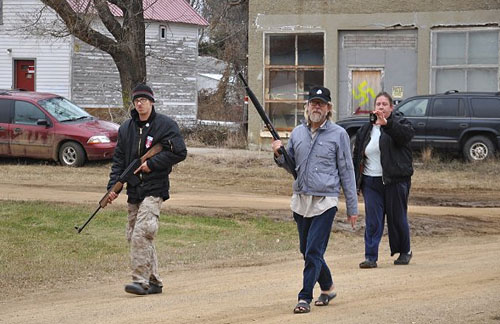
White supremacists move to a very small North Dakota town and start buying property, encouraging their friends to do the same so they can eventually "take over" the town. You can picture the resulting documentary -- the interviews with town members, the Southern Poverty Law Center (SPLC), the tension about how this potentially explosive situation will end. But you might not predict that Welcome to Leith would skillfully show you that the situation is not as clear cut as it sounds, and show the poisonous side effects of not just hate, but fear.
The film opens with an ominous 911 call -- a woman in Leith believes herself to be in peril from men roaming the area with guns. But how did matters get to that point? Welcome to Leith backtracks to show us. It begins when Craig Cobb, whom the SPLC calls "one of the top ten white supremicists in America," buys property in the town of Leith -- three miles, 24 residents, one bar. Cobb is part of a group called the Creators and has a history of publishing personal identifiable information about people who cross him ("doxxing" before that was even a word).
After Cobb buys property in Leith -- at an unbelievably low cost -- he encourages other white supremacist group leaders to buy land there and join him, with a goal of taking over the town entirely. He donates a tract of land to Tom Metzger, founder of the White Aryan Resistance. You can guess what the neighbors think -- especially the town's lone African-American resident, whom Cobb approaches about selling land. Imagine how you'd feel to see a swastika painted on a sign on your neighbor's property. The town leaders decide to change water and sewer ordinances in a way that could possibly drive the unwanted new residents out of town again.
SXSW Review: The Overnight
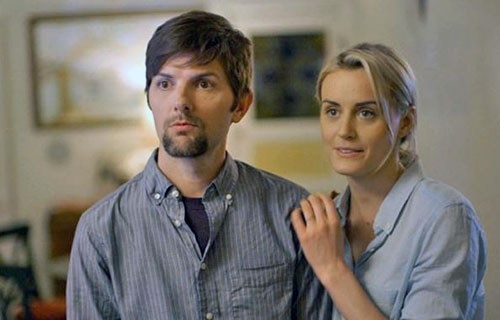
Here we have a pair of newcomers to Southern California, watching their little boy on the playground. Oh look, he's sharing his gummy worms with another boy. Oh look, here comes the boy's dad, fussing about the non-organic ingredients in the gummy worms. And just when you think this is going to turn into another Carnage, it turns out the dad is kidding, the atmosphere lightens, and everyone becomes friends ... for the moment.
After the above prologue, The Overnight sticks to its title, set primarily at a dinner party. And as the evening slowly unravels, the tension builds quite effectively and it's difficult to tell what this movie is and where it's going. It's funny, but is it ultimately a comedy? Will it be a dark comedy with a body count? Some kind of inversion on a home invasion film? Eventually you give up wondering and accept that you won't be able to relax until the movie ends.
Emily (Taylor Schilling) and Alex (Adam Scott), eager to make friends in their new neighborhood, accept a dinner invitation from Kurt (Jason Schwartzman) and Charlotte (Judith Godrèche) after meeting on the aforementioned playground. The little boys are fast friends, but Emily and Alex are more hesitant about a couple that seems a little bit ... off. Kurt wants to show off Charlotte's acting talent by showing a video clip that only enhances the awkward feelings in the air. Kurt shows Alex his studio, with art that is ... unexpected. Charlotte takes Emily on an errand that is ... entirely unexpected. If I keep trying to describe the atmosphere, I'll run out of ellipses.
SXSW Review: Results
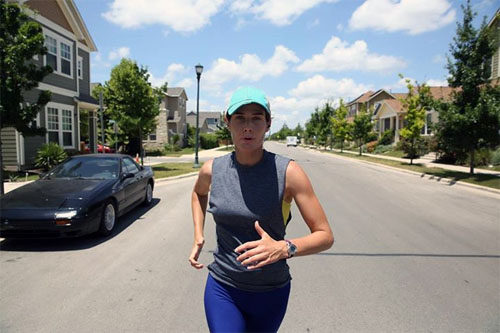
Oh my god, Andrew Bujalski has sold out. The filmmaker with a reputation for populating his indies with non-actors has brought us a film that stars, yes, stars Guy Pearce and Cobie Smulders. I don't think I saw a single indie filmmaker in the cast. And it kind of has a plot! And who knows how much money it cost -- he didn't even need to crowdfund. I mean, really, total sellout.
Except that's not the case at all. Results is very much of a piece with Bujalski's previous films, from Mutual Appreciation to Computer Chess. The Austin writer-director's insightfulness about the minutiae of everyday relationships is front and center. The "stars" play characters who work at a gym -- naturally portraying beautiful people without upsetting the balance of the cast.
Danny (Kevin Corrigan) first appears onscreen after his wife locks him out of their New York apartment. Shortly thereafter, we encounter him in an Austin gym, determined to get into shape for reasons he cannot clearly articulate to the gym's owner, Trevor (Pearce). Trevor assigns Kat (Smulders), a demanding and no-nonsense trainer, to work with Danny at his home. It's obvious Danny would like Kat in his life for more than just teaching him ab exercises, though.
SXSW Review: 7 Chinese Brothers
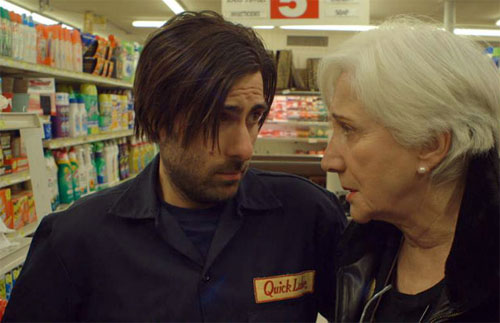
Austin filmmaker Bob Byington likes to set his films in an environment many of us recognize and understand: the featureless, tidy, chain-populated world of the lower-rent suburbs. His characters often work thankless jobs that actually exist in the real world, often in food service. They live in dumpy rentals, they drive cheap or decrepit cars. Apart from the occasional smartphone or computer, the movies could be set in any time in the past few decades and in any American suburb or small city.
And it's within these almost generic settings that Byington brings us movies about people (young men, generally) who change their lives in small but significant ways -- unexpected events leading to improbable effects. It's a slightly twisted world, but ultimately grounded by mundane surroundings.
In Byington's latest movie, 7 Chinese Brothers, slacker Larry (Jason Schwartzman) is fired from a Buca di Beppo after his bosses catch him enjoying the restaurant's booze. They accuse him of hoarding tips as well, although we never find out whether this is actually true.
SXSW Review: A Poem Is a Naked Person
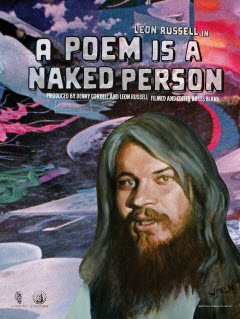 Some movies feel like symphonies or rock concerts. Some feel like comic books (or graphic novels, if you prefer). Some feel like forgotten Faulkner short stories (David Gordon Green). And yes, some rare movies feel like poems, which is not the same as movies with poetic scenes. One excellent example of movie-as-poem is Les Blank's 1974 documentary A Poem Is a Naked Person, which screened at SXSW this year -- one of its very few public screenings.
Some movies feel like symphonies or rock concerts. Some feel like comic books (or graphic novels, if you prefer). Some feel like forgotten Faulkner short stories (David Gordon Green). And yes, some rare movies feel like poems, which is not the same as movies with poetic scenes. One excellent example of movie-as-poem is Les Blank's 1974 documentary A Poem Is a Naked Person, which screened at SXSW this year -- one of its very few public screenings.
This is not your standard music biopic by any means. Descriptions of the film often note that it's about musician Leon Russell and the Oklahoma studio he built in 1972, to encourage friends to make music with him. And so it is, but don't expect a linear or straightforward story along those lines. A Poem Is a Naked Person is trying to capture the feeling of the times, a sense of being in the moment with the music rather than following an artificial narrative.
Scenes shift from a studio session to a guy painting vivid murals on swimming pool walls to a dance-hall concert to another studio session to a crowd watching a building being demolished. The movie is both hippy and dippy, in an entirely appropriate and delightful way. (Even the subtitle font is perfectly groovy.) You get to enjoy not only great musicians playing together in Russell's studio, but also everything else going on around them -- a sense of context, as opposed to talking heads telling you everything.
"Documentary" feels like both the worst word to describe this movie, as it sets expectations for a particular style of film ... and exactly the right word, because Blank has captured the time and the mood and the music and the people so perfectly. The Voice of God narrative structure would be entirely out of place here.
Ultimately, A Poem Is a Naked Person is about art everywhere you look, and what that looked like in the early 1970s -- not confined solely to Russell's musical projects. Even if you're not a huge fan of Leon Russell or the other musicians in the film, including Willie Nelson, George Jones, Ambrose Campbell, Mary Egan and Eric Andersen, you can sit back and let the music and painting and parachuting and everything else just wash over you. But you have to connect the dots yourself ... set your expectations appropriately.
SXSW Review: Tab Hunter Confidential
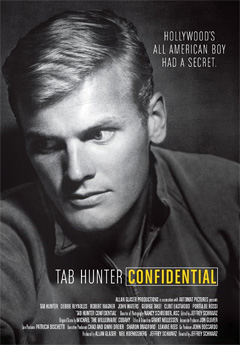 At the peak of his popularity in the 1950s and 1960s, Hollywood star Tab Hunter acted the part of the clean-cut California boy next door. But nearly 10 years ago, Hunter came out as gay. The documentary Tab Hunter Confidential, which premiered at SXSW, delves into those carefully closeted years and contrasts them with his current life, with the former teen idol himself guiding us through the narrative in a charming and heartfelt way.
At the peak of his popularity in the 1950s and 1960s, Hollywood star Tab Hunter acted the part of the clean-cut California boy next door. But nearly 10 years ago, Hunter came out as gay. The documentary Tab Hunter Confidential, which premiered at SXSW, delves into those carefully closeted years and contrasts them with his current life, with the former teen idol himself guiding us through the narrative in a charming and heartfelt way.
The movie is generally linear in its approach, a traditionally structured biography. But its subject's life is continually fascinating. For example, the sequence describing Hunter's childhood is compactly edited and doesn't feel like yet another celebrity childhood stereotype. While the film focuses on Hunter's popularity peak in the late 1950s and early 1960s, Hunter's professional and personal story continues through the present day, showing his movie-career revival in the 1980s (Polyester, Grease 2, Lust in the Dust) and his longtime relationship with Allan Glaser, one of the documentary's producers.
Perhaps if you've read Hunter's autobiography of the same name, few surprises are in store, but the film clips and interviews would still be engaging, illustrating the story of a man who's led a very complex life. Besides acting and singing, Hunter has been a competitive ice skater and throughout his life, has trained/rode horses professionally.
Filmmaker Jeffrey Schwarz (I Am Divine, Vito) has a deft touch with personal documentaries. The interviews with Hunter himself feel intimate without being intrusive. Other interviews include John Waters, Connie Stevens, George Takei, Debbie Reynolds, Clint Eastwood and ex-actress Rev. Mother Delores Hart. While the list sounds like a parade of celebrity, the interviews add insight and interest.
In addition, the archival film and TV footage in Tab Hunter Confidential is full of treasures. Many people remember Hunter at his peak as a teenage heartthrob -- can you name more than one of the movies he appeared in at that time? But he performed on TV in Playhouse 90 dramas directed by John Frankenheimer and Arthur Penn, back when such a thing was considered prestigious, highbrow fare. It's unfortunate these performances seem to be forgotten by contemporary audiences, for the most part.


